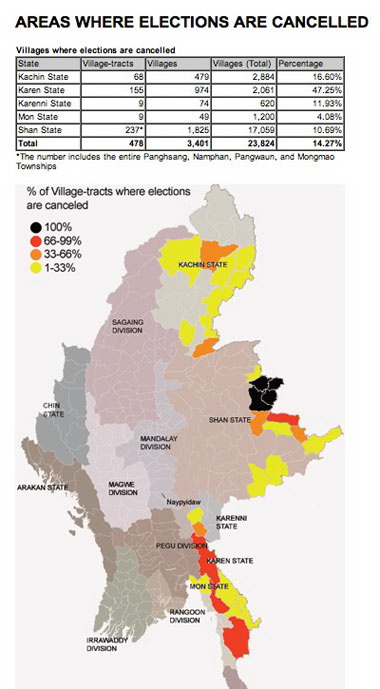Some indications of the international community’s response to Burmese elections were evident election day as poll-watchers, many unable to get in to Burma ...
Bangkok (Mizzima) – Some indications of the international community’s response to Burmese elections were evident election day as poll-watchers, many unable to get in to Burma, took refuge at the Foreign Correspondents’ Club of Thailand. Given the restrictions imposed by the junta on international observers and monitors, journalists, diplomats, rights advocates and assorted political junkies assembled, the consensus seemed to be: “wait and see, but don’t expect much change”.
 First, was this a free and fair election? Marwaan Macan-Markar, the president of the FCCT, was asked to comment on the difficulties of reporting on the Burmese election: “In any election one would expect a country to permit journalists to observe and report on what occurs on election day. The fact that the Burmese government had placed barriers on foreign journalists in covering the election raises questions on the fairness and transparency of this election process.
First, was this a free and fair election? Marwaan Macan-Markar, the president of the FCCT, was asked to comment on the difficulties of reporting on the Burmese election: “In any election one would expect a country to permit journalists to observe and report on what occurs on election day. The fact that the Burmese government had placed barriers on foreign journalists in covering the election raises questions on the fairness and transparency of this election process.
“Foreign journalists have not been granted visas, and have had to go in on tourist visas … two or three foreign journalists who have gone in as tourists have been thrown out of the country,” he said.
Somsri Hananuntasuk, a Thai observer in Burma with the Asian Network for Free Elections, speaking over the telephone from Rangoon put it even more bluntly: “This election is a joke, right? Do the party representatives understand this?”
The British Ambassador to Burma, Andrew Heyn, had appeared at the FCCT on Thursday evening before returning to Burma for the elections. A phone interview was conducted with him at 3:40 p.m. on the seventh, while voting was still in progress. He said that while many people were voting, they seemed “resigned”, as if going through the motions of a necessary chore – which was perhaps a quite appropriate description, given reports that ballots had been individually numbered and were thus traceable, raising fears of reprisals should they vote the “wrong” way.
When asked if there were any signs of violence or intimidation, he responded that “there weren’t any now”, but that there was “the feeling of a job done”.
David Mathieson, senior researcher on Burma in the Asia Division of Human Rights Watch, was asked in an interview at the FCCT about the usefulness of continuing sanctions after the election. Considering how leaky they were as a result of the co-operation of Asian and other nations with the Burmese regime, Mathieson responded that sanctions should be more precisely targeted (specifically, on the finances of leading regime figures and on weapons procurement) and more clearly researched and thought out. Thus, they would be more palatable to currently recalcitrant nations.
Regarding the humanitarian situation in Burma, he said that funding for NGO’s should be increased, and people should understand the great difficulties such NGO’s were struggling under in Burma. Specifically, he stated that “programmes that served to empower the Burmese people should be emphasised, and that the regime, while wary of such programmes, will permit them if it decides that they pose no threats”.
Canadian Ambassador to Thailand, Burma, Laos and Cambodia, Ron Hoffmann, whose embassy hosted yesterday’s FCCT event, said Canada took and would continue to take a hard line on Burma, unless there were substantial changes for the better coming out of Burma. How substantial? “Setting specific guidelines for development would be artificial and counterproductive.”
As with Heyn, Hoffmann indicated that the international community should remain open to both of the “two tracks” being taken by the Burmese democratic opposition, without prejudging between them: first, boycotts, and second, critical participation within the new government.



